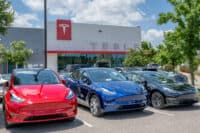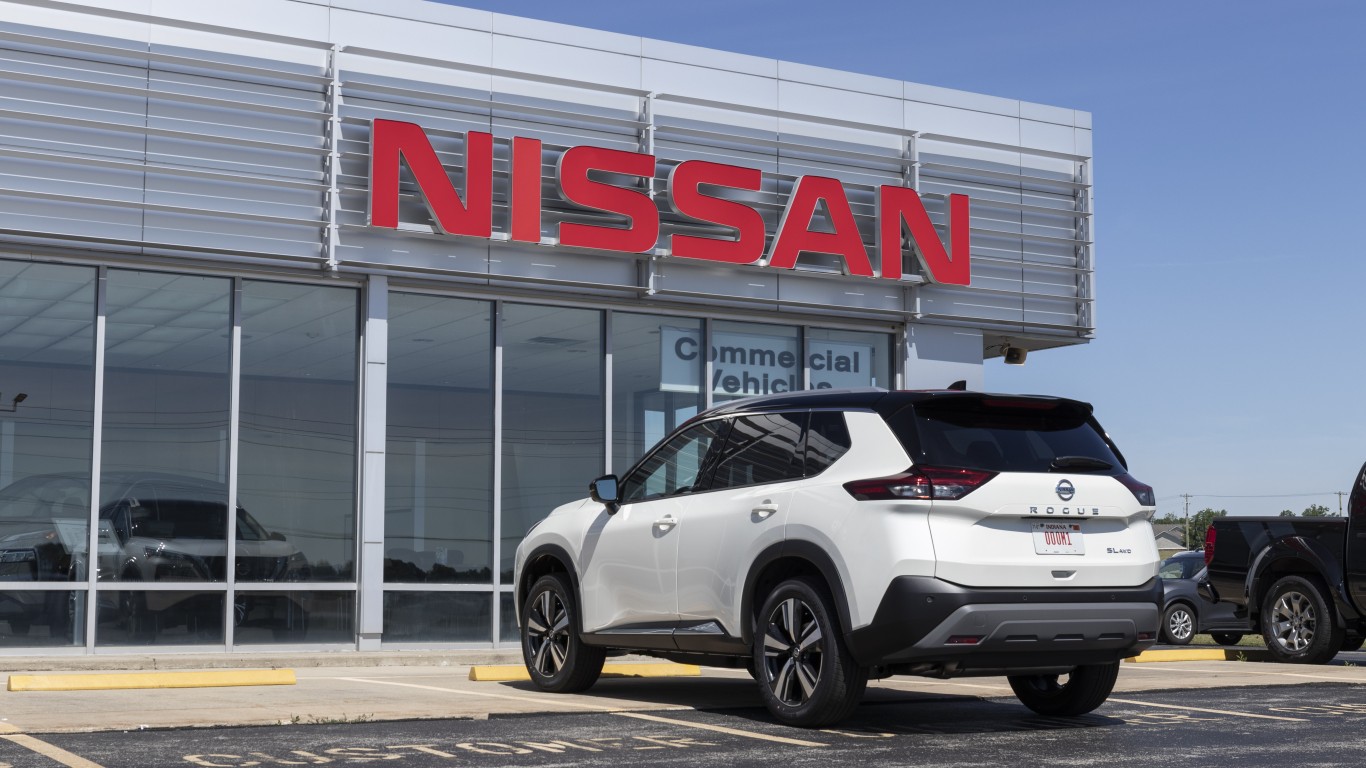

The engines used in electric vehicles (EVs) typically include 20 or so moving parts. An internal combustion engine has nearly 2,000. Shortly before noon Thursday, shares of 15 EV makers were all moving higher, thanks to Wednesday’s mammoth IPO of Rivian Automotive Inc. (NASDAQ: RIVN).
Rivian, of course, was leading the pack, while the shares moving up the least were those of Tesla Inc. (NASDAQ: TSLA), the first and largest by far of EV makers. That’s after BofA Securities raised its price objective for Tesla from $1,000 to $1,200 on Wednesday. Analyst John Murphy and his team also raised their price objectives for Lucid Group Inc. (NASDAQ: LCID) from $30 to $60 and for Fisker Inc. (NYSE: FSR) from $18 to $24. The firm gave Tesla and Fisker a Neutral rating while awarding Lucid a Buy rating.
BofA also maintained its price objectives on two other EV makers. Canoo Inc. (NASDAQ: GOEV) and Lordstown Motors Group Inc. (NASDAQ: RIDE) both carry a $5 price objective and Underperform ratings.
One interesting note in BofA’s analysis is its summation of Tesla’s dominance:
It is debatable whether any of the start-up EV automakers will ultimately be dominant over the long run, especially in a very competitive industry where the traditional automakers are also ramping up EV efforts. However, if a large global footprint can be built with no-cost capital, the “growth” story will likely continue to carry the day for the stocks. In fact, on our revised price objectives, our analysis suggests that a 10% dilutive equity raise for TSLA could fund 40+ incremental plants and 10mm+ units of capacity, which would make TSLA effectively the largest global automaker, while a 10% dilutive equity raise for LCID could fund 3+ incremental plants and 750k+ incremental units of capacity, which would make LCID a relatively large global luxury automaker.
Left unsaid there is that Lucid is never likely to catch up to, let alone pull ahead of, Tesla. That message also applies to Rivian, according to Murphy’s team:
As has proven [to be] the case for TSLA over the past decade plus, the higher the upward spiral of stocks for the EV OEMs, the cheaper capital becomes to fund growth, which is then rewarded by investors with a higher stock price. The inverse of this dynamic is also true, and it is this self-fulfilling framework that has explained the extreme moves in TSLA stock in the past, and it is a helpful framework to think about how start-up EV automaker stocks may trade in the future.
The downside risks to the group chasing Tesla include drying up of low-cost capital, inability to convert orders into sales, and failure to ramp up production. Upside risks include customer enthusiasm for the vehicles, successful execution of business strategies and incremental government stimulus for EVs.
Rivian stock traded up 24% Thursday morning, to post a new high of $124.00. The low was set Wednesday at $95.20, well above the company’s IPO price of $78.
Electric van maker Arrival S.A. (NASDAQ: ARVL) traded up more than 6% Thursday, at $14.27 in a 52-week range of $9.92 to $37.18.
Workhorse Group Inc. (NASDAQ: WKHS), another maker of delivery vans, traded up about 6.5% to $7.07, in a 52-week range of $6.02 to $42.96.
China-based Xpeng Inc. (NYSE: XPEV) traded up about 7% to $47.46, in a 52-week range of $22.73 to $74.49.
Lucid traded up more than 10%, at $44.98 in a 52-week range of $9.67 to $64.86.
Canoo traded up about 5% to $8.50, in a 52-week range of $5.75 to $24.90.
Lordstown traded up about 14.5%, at $6.36 in a 52-week range of $4.64 to $31.57. Lordstown also closed the sale of its Ohio plant to Foxconn Wednesday, giving the shares an added boost.
Tesla traded up about by about 0.5% to $1,072.71, in a 52-week range of $301.66 to $1,243.49.
Legacy automakers, virtually all of which have big plans for their own EV businesses with fewer moving parts, also traded higher Thursday morning. General Motors Co. (NYSE: GM) was up about 2.9%, at $60.96 in a 52-week range of $38.81 to $64.30, and Ford Motor Co. (NYSE: F) traded up about 1.2% to $19.60, in a 52-week range of $8.10 to $20.51.
Sponsored: Want to Retire Early? Here’s a Great First Step
Want retirement to come a few years earlier than you’d planned? Orare you ready to retire now, but want an extra set of eyes on your finances?
Now you can speak with up to 3 financial experts in your area for FREE. By simply clicking here you can begin to match with financial professionals who can help you build your plan to retire early. And the best part? The first conversation with them is free.
Click here to match with up to 3 financial pros who would be excited to help you make financial decisions.
Thank you for reading! Have some feedback for us?
Contact the 24/7 Wall St. editorial team.



